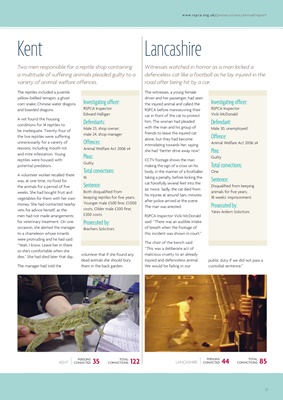
Investigating officer:
RSPCA Inspector Tina Ward
Defendant:
Female 35, groom
Offence:
Animal Welfare Act 2006 s4
Plea:
Guilty
Total convictions:
One
Sentence:
Disqualified from keeping
equines for three years;
100 hours' unpaid work;
£500 costs.
Prosecuted by:
Male & Wagland Solicitors
Investigating officer:
RSPCA Inspector Mark Buggie
Defendant:
Male 51, unemployed
Offence:
Animal Welfare Act 2006 s9
Plea:
Guilty
Total convictions:
One
Sentence:
24-month conditional
discharge; £600 costs.
Prosecuted by:
Blake Lapthorn Solicitors
ISLE OF WIGHT
PERSONS
CONVICTED 3
TOTAL
CONVICTIONS 7
HERTFORDSHIRE
PERSONS
CONVICTED 12
TOTAL
CONVICTIONS 30 Isle of WightA man abandoned his two young cats by throwing
them out of his parked car because "they did not get
on well" with his dog.
He had driven along a rural
single-track road and reversed
into a small lane. Witnesses saw
him throw the first cat into the
lane, aggressively, then reach
into the car and do the same
to the second cat. The cats
were completely disorientated
and terrified, running around
the lane and calling loudly. The
witnesses confronted him, but he
was abusive to them before he
panicked and fled the scene.
The man claimed he had been
intending to take the cats to
the RSPCA animal centre on the
island, however the route he had
taken suggested this had not
been his true intention.
The cats took shelter in a rabbit
hole and were collected by RSPCA
Animal Collection Officer Shirley
Bradley. The frightened animals
were approximately six months
old and had not had outdoor
access before, therefore their
ability to fend for themselves
would have been poor.
RSPCA Inspector Mark Buggie
said: "The Isle of Wight is no
different to anywhere else in
England and Wales; there is no
excuse for anybody to abandon
their animals." Both cats were
successfully rehomed.
HertfordshireA professional groom allowed her foal's head collar
to become so painfully embedded in his nose it
caused permanent damage to his nasal bone.
RSPCA Inspector Tina Ward found
the dun-coloured foal, called Star,
to have a head collar embedded
so far into his still-growing head
that his skin and hair had grown
over the leather. He was plagued
by flies; there were maggots in
his wounds and a strong smell
emanated from his sores.
When a vet examined Star, any
attempt to touch or move the
head collar caused him to lurch,
leap and struggle in pain.
Star, along with his mother, Ivy,
was transported to the Royal
Veterinary College's equine centre.
The head collar was removed
under general anaesthetic and
the foal's injuries were treated.
Fortunately, Star responded well
to treatment, although he was
left with permanent scarring and
damage to his facial bones.
Sadly Ivy was euthanased, on
veterinary advice, due to ongoing
health issues. Star, however, was
nursed back to health by World
Horse Welfare and has now been
successfully rehomed.
20PROSECUTIONS
Annual report OUR FRONTLINE WORK
2014